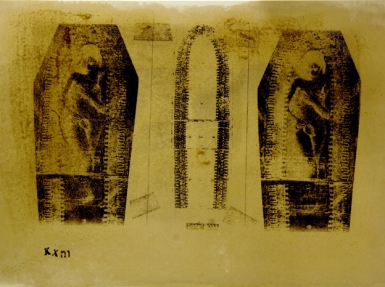Centuries of history emerge from the images, still or moving, that Eustáquio Neves captures. Rites of passage, syncretism, the reproduction of life, and the maintenance of black culture safeguarded in communities of quilombolas [former escaped slaves] in the interior of Brazil comprise the symbolism-laden yarn with which the artist from Minas Gerais weaves an oeuvre made of resistance, denunciation, and memory.
Self-taught Neves was awarded by the Videobrasil Residency Programme at the 16th International Electronic Art Festival SESC_Videobrasil (2007),an acknowledgement that led him to spend six weeks creating and studying at the WBK Vrije Academie, in The Hague, Netherlands, in 2008. There he developed the video Dead Horse, in which he relates the beginnings of cinema to the current state of film production, in a project that will be concluded by the end of the year.
Awarded the Porto Seguro Special Photography Award (2004) and the 7th Marc Ferrez Photography Prize (1994), among others, Neves also undertook a residency at the Gasworks, in London, ten years ago, during which his camera strolled around the vestiges that African roots imprinton the daily lives of British blacks.
“There is a very powerful link between Africa and the Diaspora, even in small gestures, anywhere in the world,” says the artist, in an interview to the Dossier.
In his latest work, he takes the focus off the influences that materialize outside of Africa, and portrays the present-day reality of the black continent instead: the focus is placed on the troubled reality of Lagos, in Nigeria, which is translated into the video Post No Bill, which started being produced this year, and will have a second episode.
According to the critic Eder Chiodetto, Neves’ works “show a complex artist who is highly skilled when it comes to translating his critical and historical consciousness into atmospheres, textures, and fuzzy colors,” as he wrote in an Essay on the author.
A photographer and curator, Chiodetto also claims that “the mode of thinking up the process of capturing, intervening with, and editing images” that Neves has developed, “be it in photographic series or in his more recent production, which gave rise to an enticing selection of video works, reveals an editor of worlds. His eyes, heart, and mind are on an obsessive quest … to find significance in the endless flow of information to which we are submitted in contemporary times.”
Further info on this artist available at the collection
